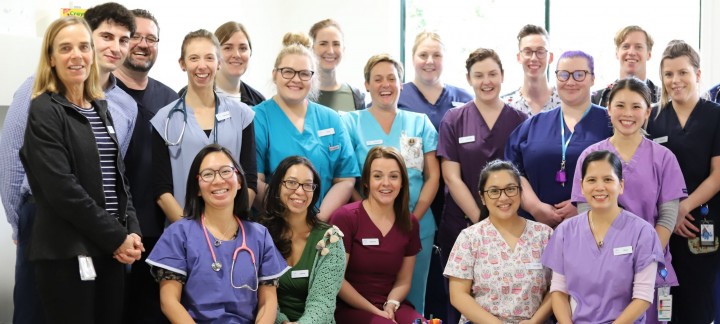Mercy Health – Health Services compares favourably with other health services, recognising in some areas there are opportunities for improvement.
Mercy Health – Health Services People Matter Survey results compare favourably with other health services overall. However, our collective results relating to job-related affect (how staff feel at work), stress, bullying and harassment, occupational violence, psychological conditions and psychosocial safety show that there is room for improvement.
The results for stress show that the majority of stress (74 per cent) was related to the nature of the work and work demands. For nurses, midwives and doctors the main stressors in their work were due to time pressure, the amount of work and shift rosters. These findings prompted a significant project on staff wellbeing.
A project working group was formed with representatives from Work, Health and Safety, Human Resources and Organisational Development. The working group’s first task was to explore the People Matter Survey results, other staff data reports and anecdotal feedback. The group also researched the academic literature, and global and local best practices. From there the group developed a Wellbeing Framework for Mercy Health – Health Services and a Mentally Healthy Workplace strategy which were approved by the Health Services Leadership Team (HSLT) in February 2020. The Mentally Healthy Workplace strategy was structured around:
- Prevent – strengthen our workplace practices and culture to enhance staff wellbeing. Key components of this strategy include:
- A risk assessment of psychosocial hazards, which prompted the creation of a new risk record for psychosocial health (incorporating the previous bullying and harassment risk record).
- Review and update of the Nursing and Midwifery Rostering Guideline to include best practice principles on fatigue management. Once we return to ‘COVID-normal’ the intention is to further develop this content into a training module for Unit Managers and Assistant Unit Managers to improve their rostering capabilities.
- The development of a ‘work demands analysis’ methodology to identify ‘pain points’ relating to work demands and identify opportunities to streamline nursing and/or midwifery workflows and processes. This methodology has yet to be applied due to the health services’ response to coronavirus and the additional demands that this placed on clinical staff.
- The implementation of a Registered Undergraduate Student of Nursing (RUSON) employment model to ease workloads of Registered Nurses and Midwives. This was implemented as part of Mercy Health’s coronavirus response.
- Other components are still being developed including Wellbeing Awards for managers who are proactive and innovative around staff wellbeing, ‘Gratitude’ e-cards, and ‘Wellbeing reflections’ in team meetings.
- Intervene – empower and equip managers and staff with the knowledge, skills and tools to respond effectively to workplace stressors. Key components of this strategy include:
- Building manager capability for developing a mentally healthy workplace. During 2020 this has not been able to progress as planned. Due to the coronavirus pandemic we provided managers with tools and resources via webinars, online manager training and ‘Manager Guide’ documents.
- Promoting proactive use of the Employee Assistance Program (EAP), which was a significant focus during the coronavirus pandemic. For the period March through August 2020, there was a notable increase of 4% in EAP usage across Health Services.
- Leveraging our Wellbeing Framework; during the coronavirus pandemic, Mercy Health established a ‘Wellbeing Hub’ on our intranet and a Wellbeing page on our Workplace by Facebook platform to provide managers and staff with evidence-based tools, resources and links to information to support their mental and physical wellbeing. Staff are reminded of the hub via regular newsletters from the Group Chief Executive Officer and other leaders. We have recorded over 800 views of the ‘Wellbeing Hub’ since it was created in August until now.
- Respond – provide timely and appropriate support to staff who report negative mental health states or incidents. Key components of this strategy include:
- Building manager capability for supporting staff experiencing negative wellbeing or poor mental health. During 2020 this has not been able to progress as planned due to the coronavirus pandemic. However EAP promotional activity has been high and we will continue to promote the service to provide the required support. As a direct response to staff feedback, Mercy Health also introduced and currently offers a number of other specialist helplines, which provide valuable resources and assistance to our staff.
All components of the strategy are underpinned by monitoring and measuring, with the People Matter Survey playing a key role. We look forward to being able to assess the impact of these initiatives through the next People Matter Survey in 2021.
We know from research that if the workplace culture is enhanced for staff and there are greater levels of wellbeing, then patient care and experience will also be enhanced.



